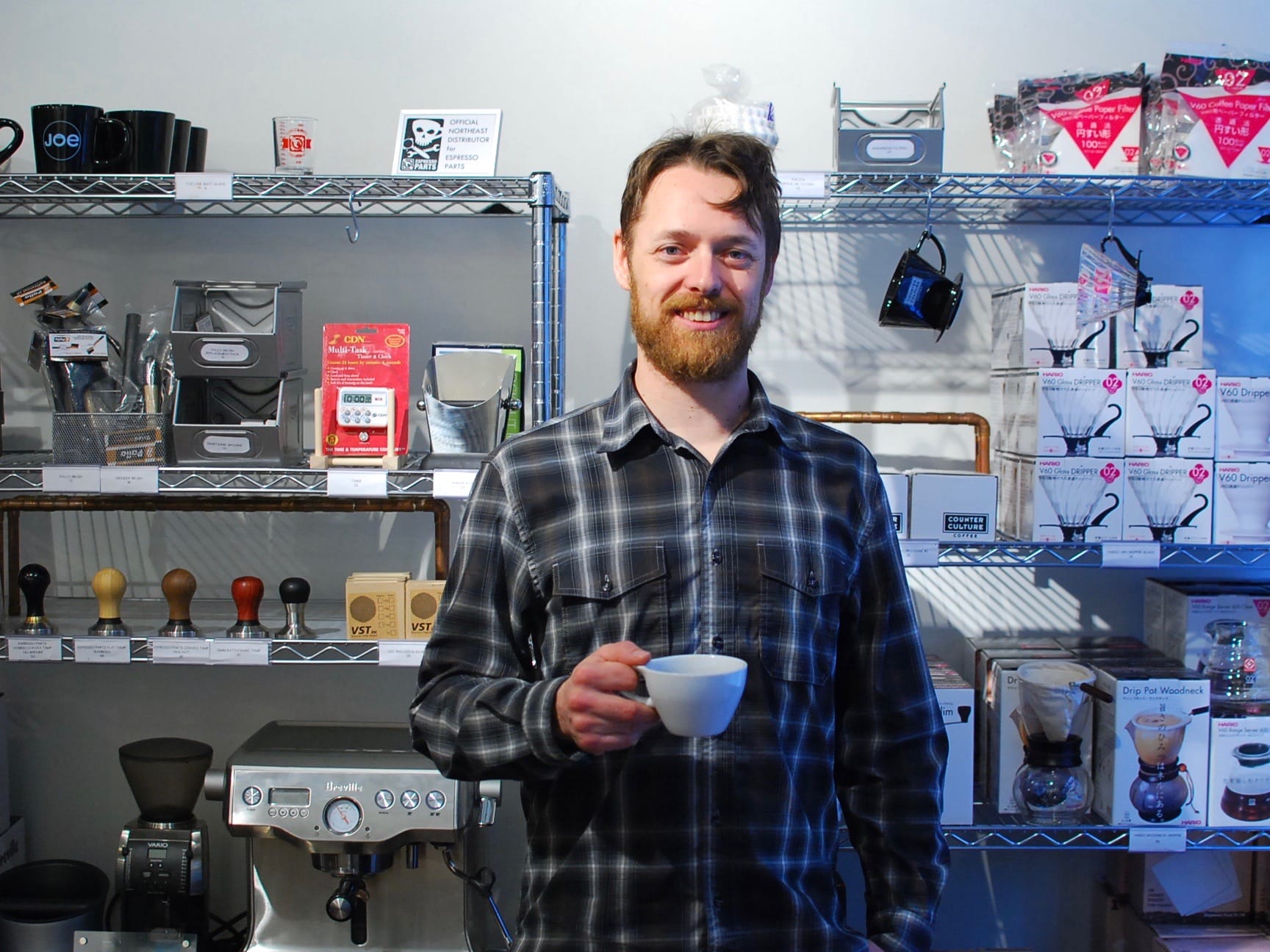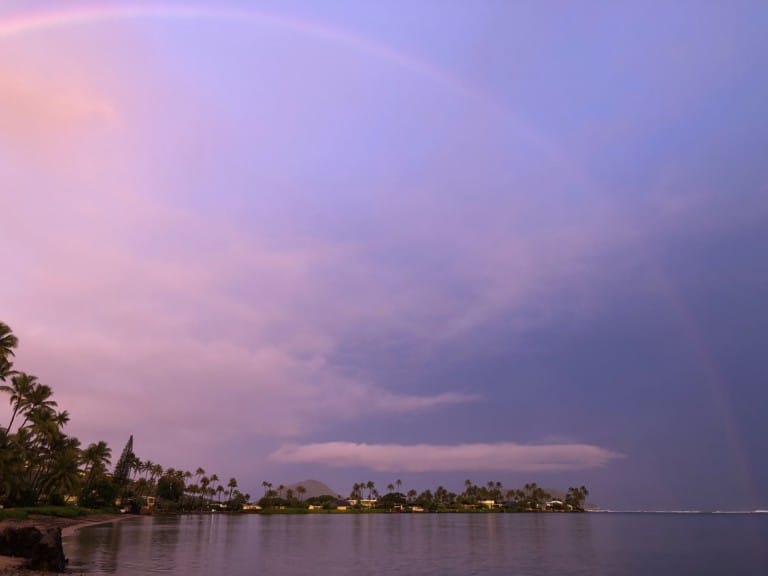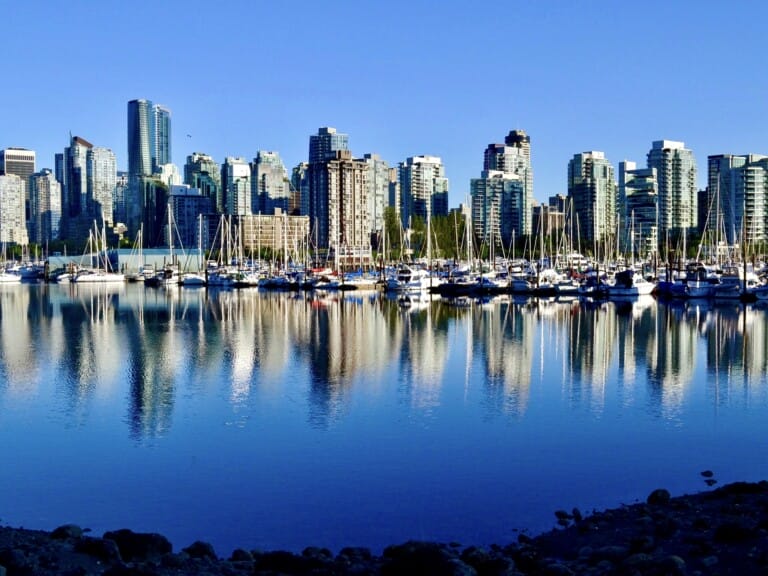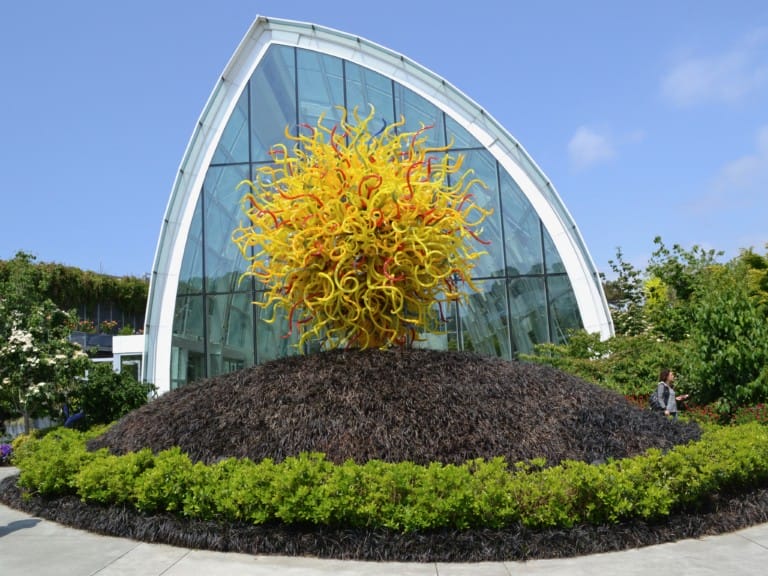Montana native Ed Kaufmann discovered specialty coffee while he was living in Portland and working as a scooter salesman and brewpub staffer. His entrée into professional coffee took place after he moved to New York. Kaufmann worked for Cafe Grumpy and as a Stumptown roaster, and now works as Director of Roasting for Joe the Art of Coffee, a growing company founded by Jonathan Rubinstein and sister Gabrielle. On January 15, we met at the Joe Pro Shop in Chelsea, and Kaufmann explained his connection to coffee and the surrounding community.
Josh Lurie: When was the point where you realized that you would work with coffee for a living?
Ed Kaufmann: Pretty quickly after I started as a barista at Café Grumpy about six-and-a-half years ago, or 2006, and within the first two weeks I met some of the best people in coffee: Peter Giuliano, Andrew Barnett, you know, some of the big names. They were all super inspirational, very positive, and even after years in the industry, they still had that magic look in their eye. Like, “Man, this is the best stuff ever,” like it was the first time they ever had ever had a cup of delicious coffee, even though it was one of thousands.
JL: They would just come into the shop?
EK: Well, we had a few tasting events when Café Grumpy in Chelsea opened so producers would visit and since Grumpy was one of the few really nice shops in New York at that time, anybody who was anybody in coffee would come through and say, “Hello.” So, we got to meet everybody just kind of by a bottleneck effect. It was really nice. Besides the delicious coffee the positivity and the people’s passion for something really delicious and positive was really attractive to me.
JL: Are you from New York originally?
EK: No. I grew up in Montana. I actually moved here from Portland, Oregon. It’s difficult to get a bad cup of coffee there, so I got used to drinking a lot of really delicious coffee there. But I didn’t work in coffee there, right when I moved to New York is when I first started working in coffee.
JL: What were you doing in Portland and what brought you to New York?
EK: I was working as a mechanic and a salesman at a scooter shop before, so I had a little bit of technical background. I worked at a brewpub as well so there was some craft beer observing experience. I didn’t brew or anything like that, but I just was ready for a change. Growing up in Montana I didn’t really see a lot of the world, but I thought New York was a good place to start seeing the world. So I decided to move here kind of on a whim, and not really with a plan in mind.
JL: How did the Grumpy opportunity come about?
EK: Well, I was talking to one of my baristas at my local coffee shop in Portland, told them I was moving to New York in three weeks and they said, “Oh it’s kind of a bummer about New York. The coffee there is a little bit rough. The situation is a little rough. Here are a couple shops that you can you know stay safe (laughs) and still get really delicious coffee.” Grumpy was one of them. So, I went right home and Googled Café Grumpy and started bugging them a month before I even moved here. Also, I asked the barista how they liked being a barista or working in coffee and they loved it. I was thinking about bartending when I got here but the hours were kind of a little crazy, getting home at 6 a.m. I grew up in food, so I wanted to do something with food or beverage in New York. It just worked out really well. I went in for an interview and was able to talk a little bit of shop with Grumpy based on a lot of the stuff that I learned at Stumptown…It was actually a Fresh Pot, but they always had a story behind the coffee and different flavor notes of each origin. So I was able to kind of regurgitate some of that in my interview with Grumpy and get the job. Then it just took off from there.
JL: When did you transition off bar?
EK: Well I kind of haven’t in a way (laughs). I still work two short shifts a week at rotating Joes which is great because, you know, it keeps it real for me. I could very easily stay behind the scenes and kind of forget how important this cup of coffee is right here or this shot of espresso or even the iced mocha, and how happy that makes people. Without that stuff, my job behind the scenes on a roaster is useless really. On a weekly basis I get that reminder and that’s great, the full spectrum.
JL: What was the first coffee you ever roasted, and where was that?
EK: The funny thing is, I decided to get into roasting coffee, so I took a class at Willem Boot, in Mill Valley, California. It was a three day long roasting class and cupping class. The very first batch I roasted was on a San Franciscan one-pound roaster. I completely murdered the batch and was so down on myself, I thought, “Okay, I can never do this. It’s so hard.” I had the worst coffee on the table after we cupped it, and then a really amazing opportunity came up with Stumptown. They were looking for a roaster in Brooklyn, so the guys approached me about that, because they knew I was starting to expand my coffee career. Years later – July – we got the exact same machine, the San Franciscan one-pounder, for our sample roaster.
JL: Did you go better this time?
EK: Yeah, it went way better. I kind of knew what I was doing this time. I saw it and thought, “I’m going to conquer this machine.”
JL: What does a coffee have to be at Joe for you to roast it?…What is the company looking for?
EK: That’s a great question because I can really take my direct experience on bar and equate it to the roaster or the cupping table when we’re buying coffee. I know personally, sometimes I want some crazy complex coffee that’s got wild acidity, pineapple upside down cake coffee, or Wonka coffee, as I call it sometimes. But I know our customers aren’t going to like that. In fact, most of them aren’t, so what I look for are sweet, clean coffees that taste like where they’re from, and kind of give a gateway to customers who come in every day and might say, “I’ll take a small black coffee.” They never think about it, but I like to throw them little tidbits and little keyholes to look into, so when they do want to know more about their coffee, we’re ready with our fair traceable transaction with the coffee – how we purchased it, our connection to the place has grown and the people who grew it – we’re ready with all that information, but it’s got to be balanced.
JL: How does the collaboration work with you and the owners, in terms of the decision making on the beans?
EK: So far, the transition for them has been really good for all of us. They’re very supportive of the roasting department. They leave the decisions up to me and the other two people who do all the cupping for green purchasing. Then working out the logistics of cash to purchase green coffee versus brown coffee is a little different, so we’re ironing out all those systems as we go. I had some previous organizational experience before with managing green inventory, but it’s really positive so far. They’ve been very collaborative in decision making, and that’s very positive.
JL: You’re at about 10% right now of house-roasted coffee?
EK: Yeah.
JL: Is the plan to increase that percentage over time?
EK: Yeah, it is. We’re going to do what feels right. So far, we’re doing a small chunk of coffee and making sure the systems are in place, and the people are in place, that are going to have the jobs that are involved in a full-on roasting operation. We have those people in place, so when we decide to flip that switch or take on more, we’ll just be able to plug in different numbers, as opposed to rebuilding everything. Eventually, we’re going to start buying more green and making more relationships and hopefully roasting more of our coffee.
JL: The Pro Shop, is this the most recent location for Joe?
EK: As of now, yes. We have two locations opening in Philadelphia.
JL: Are those the first outside of the city?
EK: Yep. Unless Brooklyn is considered outside of the city. [laughs]
JL: Not to me. I guess to some people.
EK: Not to me either.
JL: What was the vision for the Pro Shop?
EK: For one, we wanted to have a coffee shop in front of our offices, and a space where we could train our baristas. We could have classes for the public. Also, we’ve allowed other companies to come in and hold events here. Other roasting companies, like Dallis and [Brooklyn College] Coffee Collective – they do a lot of green stuff – it’s just a great venue for coffee related events. Also, we wanted to have a place where coffee geeks like us could come buy a tamper, or a brush for their espresso machine, or just a gear store for coffee geeks.
JL: In terms of the coffee program here [at Joe Pro Shop] versus the other coffeehouses, how is it similar and different?
EK: It’s different in that we use multiple roasters here, and our menu is curated by the Director here. His title’s Manager, but he’s more of a Director of Coffee here. His name’s Brendan [Mullaly], and he pretty much hand selects all the coffees that we serve here.
JL: The brewing equipment that you’re using here, does that differ too?
EK: Yes. Everything’s brewed by hand here, even the coffee in the airpot, we brew Chemex. People can either come in and get that if they say they want a small coffee – that’s what they get – or they can order off a menu and we’ll do a pourover of different origins, different roasters. It’s pretty special.
JL: You have a lever espresso machine?
EK: Yes. We wanted to do something a little different, something that highlighted rotating espresso selections as they came through. It’s really easy to work with and I feel like it really highlights the differences between the coffees without overdoing it.
JL: Do you have a house espresso blend that you’re roasting?
EK: Not yet. I’m only roasting two single origins. We’re still getting our house blend from Ecco/Intelligentsia.
JL: What was the very first cup of coffee you remember drinking in your life?






Leave a Comment